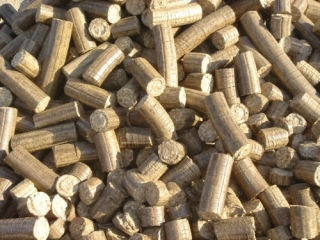BriquettesSolid biofuelsEco-briquettes Biomass briquettes are produced from agricultural waste and are a substitute for fossil fuels such as petrol or coal and can be used for boiler heating in production companies and for domestic application. Biomass briquettes are a renewable source of energy and a means to avoid the accumulation of carbon dioxide in the atmosphere. Biomass briquettes help to save on boiler fuel expenses. Through the use of biomass briquettes carbon credits for reducing the atmospheric emissions can be awarded. Biomass briquettes also provide higher caloric value per kilogram which saves approximately 30-40 % of the boiler fuel expenses. Briquettes are manufactured of wood-processing or plant-growing waste biomass from the agricultural sector. No adhesive materials are used in the moulding process. The lignin which is naturally present in the biomass connects the particles and forms them under the influence of high temperature in the pressing process. The combustion of eco-briquettes is much more effective than the one of firewood. The moisture content in briquettes may be much lower, around 4% while in wood this content may be higher than 65%. To illustrate this, an example of eco-briquettes produced through extrusion follows:
Eco-pellets Eco-pellets are a subtype of the energy products produced from biomass. For the first time they have been used in Europe in Sweden in the beginning of the 1990s. Along with the basic advantages, pellets can be used in boiler installations with automated feeding and dosing system for a controlled combustion process. „Rapid Oil Industry“ Co., Ltd. manufactures eco-briquettes and eco-pellets from residual biomass – straw, corn, sunflower. The feedstock is pre-processed by being dried and grinded. This type of bio-fuel excels with a high caloricity – 20-25 MJ/kg at significantly lower levels of ash, sulphur content and harmful emissions in the atmosphere, compared to fossil fuels. The pellet production corresponds to the requirements of standards DIN 51731. The basic qualitative indicators are:
|




